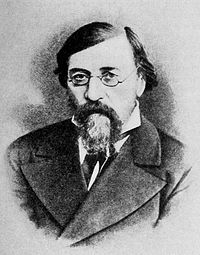Nikolai Chernyshevsky
Nikolay Chernyshevsky  |
|
|---|---|
| Born |
July 12, 1828 Saratov, Imperial Russia |
| Died | October 17, 1889 (aged 61) Saratov, Imperial Russia |
Nikolay Gavrilovich Chernyshevsky (Russian: Никола́й Гаври́лович Черныше́вский; 12 July 1828 – 17 October 1889) was a Russian revolutionary democrat, materialist philosopher, critic, and socialist (seen by some as a utopian socialist). He was the leader of the revolutionary democratic movement of the 1860s, and had an influence on Vladimir Lenin, Emma Goldman, and Serbian political writer and socialist Svetozar Marković.
The son of a priest, Chernyshevsky was born in Saratov in 1828, and stayed there till 1846. He graduated at the local seminary where he learned English, French, German, Italian, Latin, Greek and Old Slavonic. It was there he gained a love of literature. At St Petersburg university he often struggled to warm his room. He kept a diary of trivia like the number of tears he shed over a dead friend. It was here that he became an atheist. He was inspired by the works of Ludwig Feuerbach and Charles Fourier. After graduating from Saint Petersburg University in 1850, he taught literature at a gymnasium in Saratov. From 1853 to 1862, he lived in Saint Petersburg, and became the chief editor of Sovremennik ("Contemporary"), in which he published his main literary reviews and his essays on philosophy.
In 1862, he was arrested and confined in the Fortress of St. Peter and Paul, where he wrote his famous novel What Is to Be Done? The novel was an inspiration to many later Russian revolutionaries, who sought to emulate the novel's hero Rakhmetov, who was wholly dedicated to the revolution, ascetic in his habits and ruthlessly disciplined, to the point of sleeping on a bed of nails and eating only raw steak in order to build strength for the Revolution. Among those who have referenced the novel include Lenin, who wrote a work of political theory of the same name. In 1862, Chernyshevsky was sentenced to civil execution (mock execution), followed by penal servitude (1864–72), and by exile to Vilyuisk, Siberia (1872–83). He died at the age of 61.
...
Wikipedia
